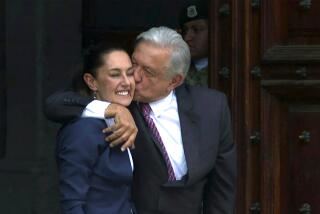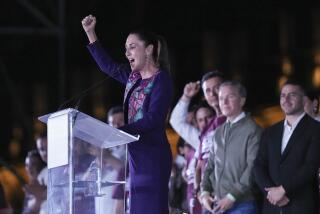Aquino Could Make It a Real Revolution
âItâs people power,â said Lt. Gen. Fidel V. Ramos, reflecting on the almost bloodless revolution that brought Corazon Aquino to the Philippine presidency.
Still, it was a revolution. And now the process of nation-building has to begin.
While the peaceful revolution left government facades still standing, 20 years of rule by Ferdinand E. Marcos had destroyed what went on inside. There is a constitution, tailor-made to suit Marcos and with no popular support. There is a National Assembly that rubber-stamped every Marcos whim. There are local government officials hand-picked by Marcos, and a judiciary with no respect. And there is an economy plagued by inefficiency and corruption, not to mention a problem-ridden military and educational system.
President Aquino needs not only to develop programs; she needs also the mechanisms to implement them. At the same time, she will be contending with the conflicting demands of competing power centers.
She could begin by fulfilling the promise that Marcos made when he declared martial law in 1972. He promised to end lawlessness by confiscating the weapons of private armies, and to redistribute wealth, concentrated in the hands of a few. It was Marcosâ promise, but Aquino can redeem it.
To do so, she will need to change the Philippine constitution. It is to be hoped that this can be accomplished without holding a constitutional convention--a time-consuming process when time is of the essence if reforms are to take hold before old ways reassert themselves. Perhaps the Marcos constitution could be amended through the referendum process, coupling it with early local elections.
The new constitution might also carry a conflict-of-interest provision to separate personal and public interests, often blurred in the past by Filipinos. Aquino is off to a good start in this regard by choosing a cabinet of individuals of great personal integrity, who now have an opportunity to enshrine their high standards for future generations.
There is much that the United States can do to encourage reform in the Philippines, but this is a new chapter in our relationship. We have influence but little leverage; we can advise but not force. While Filipinos need U.S. aid and advice, this is a revolution that they accomplished on their own. They owe Ronald Reagan little. Instead of the traditional patron-client relationship, our relations will be founded more on the basis of partnership. In Cory Aquino, we will be dealing with an equal.
At this point it would be most productive for the United States to downplay our security relationship with the Philippines. Making our bases an issue, by talking about renegotiating the lease or relocating them, will only cause problems for the Aquino government and play into the hands of the communists.
Equally important, we must not thrust more aid at the Philippine military than it can now absorb. The rebuilding process must begin from the ground up, with an emphasis on training programs and facilities rather than on military hardware.
We must also refocus our economic assistance away from constructing markets and schools to a concern for what goes on within their walls, emphasizing curriculum and equipment and, in the marketplace, new products and techniques. We should continue to encourage the breakup of government agricultural monopolies and corporations.
President Aquino has a daunting task ahead of her, but she sits astride the most powerful political movement in Philippine history. If she can translate âpeople powerâ into changes in Philippine society, she will have really led a revolution.
More to Read
Sign up for Essential California
The most important California stories and recommendations in your inbox every morning.
You may occasionally receive promotional content from the Los Angeles Times.










